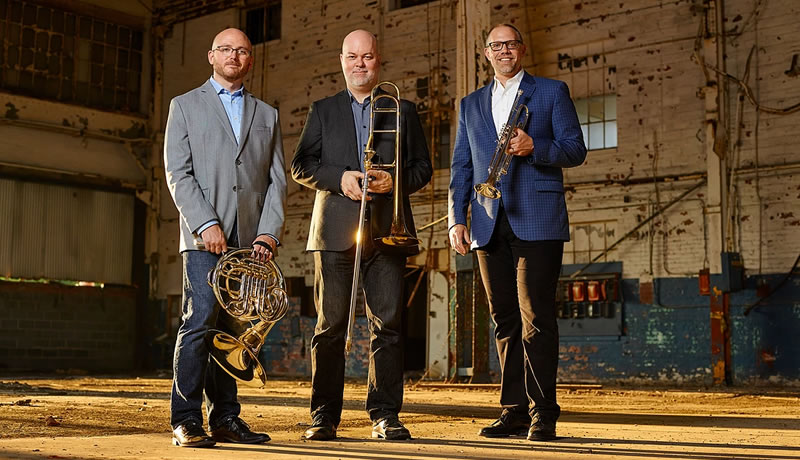Music for a Great Space kicked off its 27th season at Christ United Methodist with a wildly careening program by the Factory Seconds Brass Trio; selections included music from the Middle Ages to works written by living composers. The ensemble’s name is derived from the fact that each musician occupies the second chair position in his respective section with the Cleveland Orchestra (and, according to the ensemble, because music for brass trio is 2nd fiddle to brass quartets and quintets). The crack musicians are Jack Sutte, trumpet, Jesse McCormick, horn, and Richard Stout, trombone; all are also faculty members at Baldwin Wallace Conservatory. The bios may be read here.
The evening opened with several short compositions by Medieval and Renaissance composers (all arranged by trumpeter Sutte) beginning with “Viderunt Omnes” by Leonin (France, c.1150-1201). The trio played the original Gregorian chant in unison, then proceeded to play the two-part composition with trombonist Stout taking the flowing melody – hauntingly beautiful.
Next up was “Hear Ye Christians” by Hans Sachs (Germany, 1494-1576). Again, the trombone took the lead. “Veni Sanctus Spiritus” by John Dunstable (England, c. 1390-1453) is an arrangement of a four-part motet. Both of these versions pit unison playing against three-part writing. The occasional use of muted trumpet adds icing to the tonal cake.
Three chansons by Jacques Arcadelt (Franco-Flemish, c. 1507-1568) gave further proof of the superb musicianship of the three. Breathing together as an organic unit resulted in great ensemble, and spot-on intonation coupled with the terrific acoustics of the church made for wonderful music-making.
The Sinfonias (or Three-Part Inventions) by J.S. Bach (Germany, 1685-1750) were originally written for the keyboard, but these arrangements by Michael Galloway were a perfect fit for the trio. The group dove into the C major invention at a break-neck speed which resulted in some of the music not being perfectly in synch. The C minor and D major inventions provided good contrast.
Three fugues from Ludus Tonalis by Paul Hindemith (Germany, 1895-1963), also arranged by Galloway, served as a great 20th century foil to the Bach. Indeed, I found these arrangements more interesting than the keyboard originals.
Throughout the evening Stout served as commentator on the music being performed. After intermission he explained that the compositions in the first half of the concert were arrangements; the second half was given over to works written specifically for brass trio. Factory Seconds has recorded all four of the compositions, soon to be released on CD.
Brass Trio No. 1 by trumpet player Robert Nagel (United States, 1924-2016) is a five-minute piece that begins in a slow, solemn manner that yields to a faster section and closes with a relaxed ending.
“Mobiles” by Clint Needham (United States, b.1981) was written expressly for Factory Seconds and was influenced by the mobiles of Alexander Calder (United States, 1898-1976). Quirky riffs interject into unison playing and clusters and mutes all helped to bring out some of the humor inherent in the score.
“Madrigaletti” by David Loeb (United States, b. 1939) was also a commissioned work for the trio. The five-movement composition features alternating tempos and characters, all played without a hitch.
The final composition of the evening, Trio for Brass Instruments by Leslie Bassett (1923-2016), is “heavy, serious, and dense” according to Stout. Indeed, the solidly constructed, three-movement composition deserves more than a single hearing to be fully appreciated. The fast middle movement contains some offbeat licks which contrast with the slower outer movements.
The performance by Factory Seconds set a high bar for the remaining seven concerts of the season, all of which explore “Instrumental Voices” (the moniker of this season) including guitar, organ, string quartet, clarinet and piano duo, and piano duet.
Factory Seconds will be giving a recital at Meredith College on Saturday, September 14, followed by a masterclass on the 15th. See our sidebar for details.
Note: The writer is a former president and board member of Music for a Great Space.











